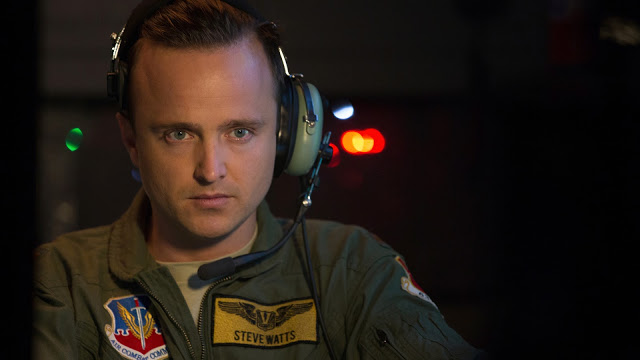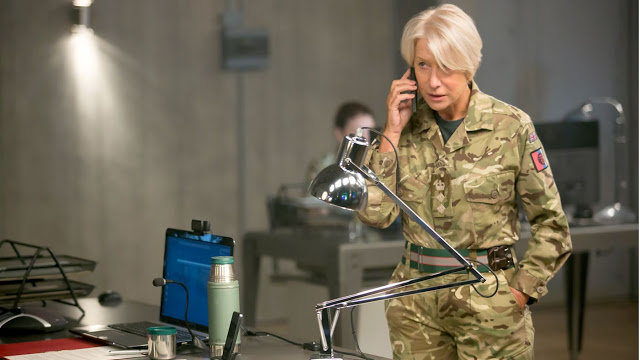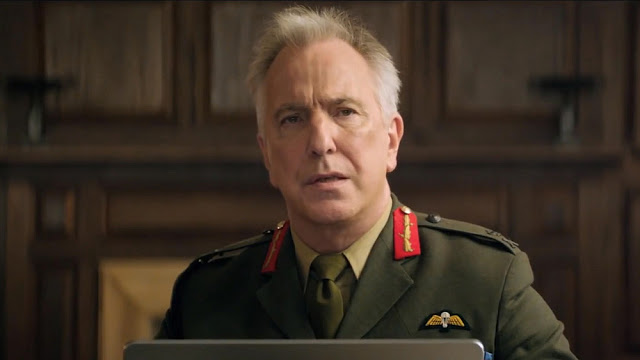Eye in the Sky is the kind of movie that seeks acclaim simply for existing. It is designed to ask thorny questions about geopolitical warfare in the terrorist age, to make you plumb your conscience and grapple with the inherent tensions between morality and security. It’s a noble objective—these are questions that we all should be asking ourselves, and our elected officials—but Eye in the Sky fails to execute its mission with the necessary nuance. It feints at complexity, but it is actually shrill, a didactic sermon that is less interested in probing than proselytizing. Ultimately, the only question it asks is this: “Are you willing to murder an angelic young girl just to stop a few terrorists?” Answer wrong, and ye be judged.
To be fair, Eye in the Sky takes its time before it sheds its camouflage of earnest inquiry. In its opening scenes, it hopscotches around the globe, introducing us to the various players who will take part in its game of philosophical purgatory. These include: Colonel Katherine Powell (Helen Mirren), a British military commander stationed in Sussex who is remotely overseeing an operation in Kenya; Lieutenant General Frank Benson (Alan Rickman, in his final onscreen performance), Powell’s superior who monitors the operation from London, in a roomful of anxious bureaucrats; Jama Farah (Barkhad Abdi, in his first role since Captain Phillips), a Kenyan field agent providing ground support; and Steve Watts (Aaron Paul), an Air Force pilot in Nevada charged with manning the surveillance drone that gives the film its title.
From all those names and locations—and I didn’t even mention the facial-recognition specialist in Pearl Harbor—you might think that Eye in the Sky is a hectic military thriller, with action taking place on three continents simultaneously. In fact, the movie features virtually no action at all. Its nominal plot revolves around a clandestine meeting of suspected terrorists in Nairobi. Although Powell’s mission is initially deemed “capture, not kill”, things change once Farah’s mobile camera (in the cool-looking guise of a flying electronic beetle) discovers that the suspects are distributing vests and explosives, suggesting an imminent suicide bombing. At this point, Powell and Benson insist that an immediate drone strike is necessary to prevent such a future attack, but the politicians are less certain.
Director Gavin Hood dresses up these proceedings with some artificial flair—tight editing, intense close-ups, an urgent-sounding score from Paul Hepker and Mark Kilian—which helps disguise just how inert Eye in the Sky is as a piece of cinema. Removed from context, the movie is really just a series of scenes of people talking on the phone and watching TV. (A significant conversation even takes place via instant messaging.) It presents a serious challenge to the actors, each of whom must stare at electronic displays, furrow their brows, and say things like “Damn it!” or “Zoom in!” in a panicked tone. Despite the impressive caliber of the cast, only Paul and Phoebe Fox (playing his copilot) add any dimension to their roles; everyone else is a pure archetype. From a visual perspective, Eye in the Sky isn’t so much a movie as a radio play.
But action and visuals are not Hood’s concern. He is instead interesting in mapping the moral contours of the war on terror, and in dramatizing the collision between our collective desires for safety and security and our long-held values of liberty and due process. It’s a conflict he previously explored in Rendition, another would-be thriller in which Hood dissected the CIA’s much-disputed policy of dispatching suspected terrorists to other nations for “enhanced” interrogation. (Along similar lines is Lions for Lambs, Robert Redford’s sociopolitical snoozefest about, er, I forgot.) As a result, Guy Hibbert’s screenplays features many fraught conversations about weighty concepts like collateral damage, the propaganda war, and the right to trial. The purpose of these loaded chats is to force the audience to engage, to make you place yourself in these people’s shoes and wrestle with the agony of making a decision.
Which is fine, in theory. Eye in the Sky may be a visual bore, but its subject matter is not without interest. There is also a sly level of macabre humor to the film’s depiction of British government, in which every politician hems and haws, attempting to avoid any semblance of responsibility by “referring up”. (In contrast, the two American officials who contribute to the dialogue betray absolutely no compunction about bombing these bad guys back to the stone age.) The premise is that these questions are so incredibly difficult, no decent human being can satisfactorily answer them.
Except that the movie does answer them, and with a simplistic fury that is as strident as it is disappointing. It does so through the character of Alia (Aisha Takow), an adorable nine-year-old Kenyan girl who just happens to be selling some delicious-looking bread right outside the house where those nasty terrorists are conspiring. Like everyone else in the film, Alia is not a person but a cipher, a symbol of the catastrophic consequences of drone warfare. Her appearance results in yet another round of vigorous debate; Powell and Benson both rationalize that her potential death is a cost they can pay if it means averting a massacre, while others point out that the state-sanctioned assassination of a child might not be great for the ole public relations machine. But where does the movie come down on this issue? Did I mention that Alia is a sweet-faced cherub who demurely obeys her father and is spectacularly good with a hula hoop?
To be clear, I am not criticizing Eye in the Sky for possessing a point of view. But there is something troubling about this movie’s highly schematic nature, the way it expresses its viewpoint in such self-righteous and clumsy ways. The film’s structure is fundamentally deceitful: It insists that it is simply presenting both sides of the argument, but it’s really dealing from a stacked deck. The result is a picture that is provocative, yes, but also indecently manipulative.
Between this film and Rendition, it is clear that Hood, who hails from South Africa (filming took place in Cape Town), is deeply disturbed by the prevailing trends in the modern military, trends that arguably favor cruel, remote violence at the expense of true justice. I share in his anxiety. But a passionate heart does not always yield a complete and coherent movie. And Eye in the Sky is less a movie than an ethics exam. It seeks to expose global injustice, but the irony is that it falls victim to the very ugliness it decries. It treats its characters—and its audience—as mere pawns, sacrificed in the service of the greater good.
Jeremy Beck is the editor-in-chief of MovieManifesto. He watches more movies and television than he probably should.




I'm intrigued by your review, Jeremy. You seem to read the film as an unbalanced condemnation of drone warfare. I saw it as an unbalanced justification for it. http://angelandelephant.blogspot.co.uk/2016/04/we-bomb-because-we-care.html
Perhaps the film is a kind of political Rorschach test. At least we both agree that it matters what it has to say about this important question.
That's very interesting. You make some valid points in your review, though I think the closing sequences that you mention tip Hood's emotional hand. In any event, yes, these are undoubtedly questions worth wrestling with.